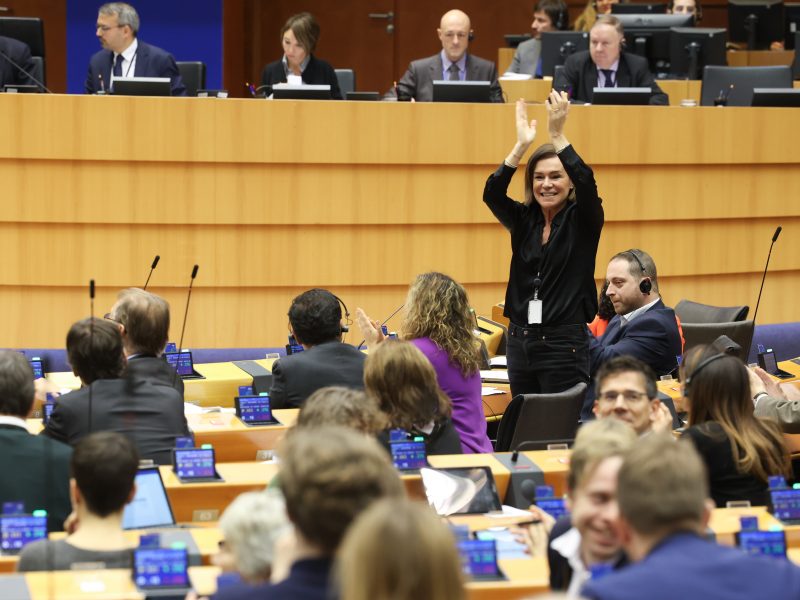
The Swedish presidency of the EU Council of ministers is circling back to a fundamental aspect of the Platform Workers’ Directive after the previous presidency fell short of securing a majority.
A Social Questions Working Party, a preparatory body that deals with social affairs in the EU Council, is due to dive back into the basics of the platform workers’ directive, with a focus on the triggering and applicability of the legal presumption of employment.
It is the first time that the platform workers’ directive will be discussed under the Swedish Presidency – after the Czech’s proposal failed to receive ministerial approval last December.
The Swedes have been openly critical of the Commission’s proposal text and instead voted in favour of a more liberal version at a Committee of Permanent Representatives (COREPER) meeting on 8 December 2022.
In an interview with EURACTIV in December, Employment and Social Affairs Commissioner Nicolas Schmit warned against the Czech proposal that, in his view, strayed too far away from the Commission’s original text.
On Monday (13 February), national representatives were asked to put their views based on some questions shared by Stockholm about the triggering, applicability and fulfilling of the legal presumption, according to a presidency note seen by EURACTIV.
The note “set[s] out the Presidency’s appreciation of the current state-of-play and to deepen the understanding of certain outstanding issues in order to forge a way forward”, it reads.
While the Swedes consider most of the directive’s chapters, including on algorithmic management, to be largely agreed, they focused on the legal presumption – which is the file’s most sensitive and politically-explosive aspect.
Over the past months, the file saw member states split into three distinct camps. The liberal side, which includes the Central and Eastern European states, saw any text with a legal presumption and clearly-enshrined criteria with concern, warning that platforms’ business model could be at risk.
A second camp that includes Spain and Portugal, among others, was openly in favour of the Commission’s text and welcomed legally-binding criteria.
Finally, a third camp felt comfortable with the Czech proposal.
Germany, a key state that could sway the final vote, has so far chosen to abstain. Berlin’s governing coalition split between the social democrats and the liberals has stopped the country short of agreeing to a position.
Triggering the legal presumption of employment
Attachés meeting on Monday have been asked to share their views as to whether the list of criteria designed to trigger the presumption is now framed “in such a way that the right people, i.e. mostly the bogus self-employed, will be covered by the legal presumption?”
The fear from platforms and several liberal-minded member states is that the Commission’s initial criteria were so all-encompassing it could lead to mass reclassification from self-employed to employed.
As a result, the Czech presidency increased the presumption-triggering threshold from two criteria out of five to three out of seven. Criteria had already been reworked, so the bar to trigger the presumption had ultimately been increased.
Criteria include determining the remuneration, requirements such as wearing a uniform, overseeing performance, preventing workers from organising their own working schedule, and restricting the possibility of working for someone else.
Delegations have also been asked to give “concrete examples” of instances where self-employed workers other than bogus ones would be at high risk of reclassification under the current criteria drafting.
Another issue of contention about the criteria has to do with instances where a platform fulfils one of the presumption criteria out of sheer compliance with EU or national law.
The Czech presidency added a specific clause to cater to this risk in previous negotiations in the second half of 2022 – and the Swedes have asked delegations whether this provision was “necessary”.
Tax, criminal and social security proceedings
The note also looks into the effects of the presumption on tax, criminal and social security proceedings – as some delegations had asked previously that the presumption not apply in such instances.
They had claimed at the time that it would be a way to preserve national competence over such proceedings, and “in some member states, the criteria for the existence of an employment relationship in a specific field of law might differ from another area of law”, the note reads, such that a national discretion is required.
Again, the Swedes seem to want more concrete, real-life examples of the impact of such exclusion and ask delegations whether tax, criminal and social security proceedings are an exhausting list of proceedings in which the presumption ought not to apply.
Finally, considerations will be given to the discretion given in the Czech proposal to member states not to apply the presumption if it is “manifest” that it would be rebutted in a legal or administrative proceeding.
In parallel, the European Parliament agreed on a mandate for interinstitutional negotiations on 2 February.
[Edited by Luca Bertuzzi/Nathalie Weatherald]









